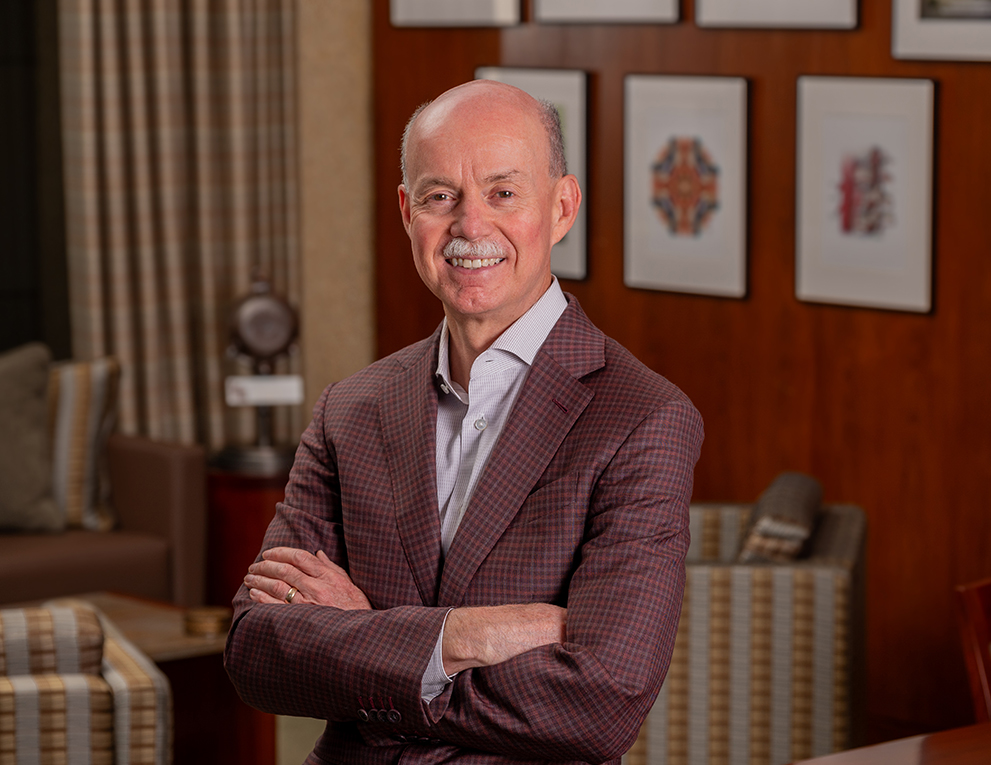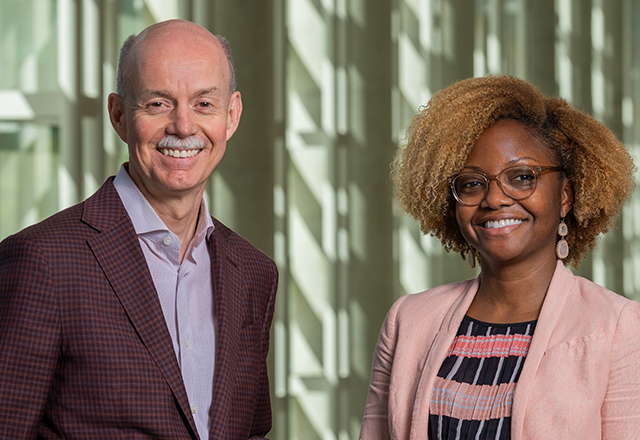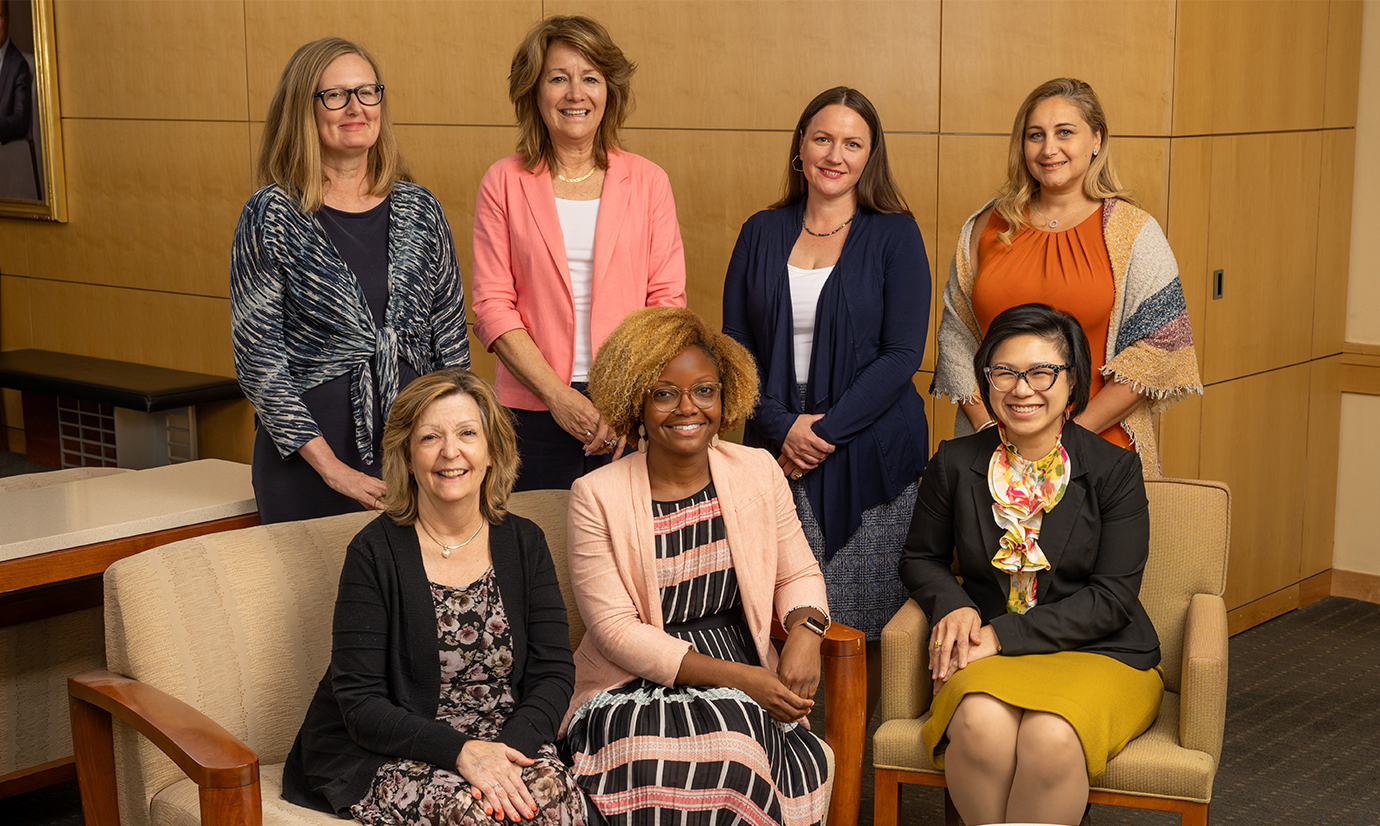One Long Day in the Life of Dean Ted DeWeese
Interim med school and Johns Hopkins Medicine leader starts early, ends late.

Physician-researcher and interim dean and CEO Theodore DeWeese.
Michael Ciesielski
Theodore L. DeWeese, interim dean of the Johns Hopkins University School of Medicine and CEO of Johns Hopkins Medicine, agreed to give Dome readers a peek into his busy schedule. This article compiles events from DeWeese’s calendar over two weeks in the spring of 2023.
Appointed to the interim role by Johns Hopkins University President Ron Daniels and the Johns Hopkins Medicine board of trustees following Paul B. Rothman’s retirement in 2022, DeWeese is charged with oversight of the medical faculty and the more than 40,000 people who are employed by Johns Hopkins and its member organizations. It’s a lofty position for the physician-scientist who never expected to attend college, much less medical school.
His workdays begin before dawn and regularly stretch late into the evening. Supported by a dedicated team led by chief-of-staff Marissa McKeever, DeWeese is prepared for each commitment on his calendar.
RISE AND SHINE
At the Baltimore County home he shares with his wife Bonny, an alarm clock buzzes at 4:45 a.m. DeWeese is already awake. Well, almost awake.
“It’s that kind of half-asleep thing where you know the alarm’s about to buzz,” he says. After a shower, he spends 20 minutes or so meditating to anchor himself and prepare mentally for the day ahead.
DeWeese describes himself as “regimented” in his morning routine.
“I eat the same breakfast literally every day: orange juice, water, my high-fiber cereal. Effectively, it’s cardboard in almond milk,” he says with an easy laugh.
DeWeese begins his drive to East Baltimore long before the morning rush hour clogs the roads. During his commute, he listens to classical music on a local public radio station.
“I like a lot of different kinds of music,” says DeWeese, who played the drums in his youth. At his Colorado high school, he says, musicians who wanted to play in the jazz band had to also play in the school’s orchestra. “That’s where I learned to love classical music.”
DeWeese’s 6:30 arrival puts him among the first in the dean’s office suite in the Miller Research Building. Most days, chief-of-staff McKeever and executive specialist Kathy Long arrive at work near the same time as DeWeese, as do Executive Vice Dean Landon King and other leaders.
McKeever has an office across the spacious first-floor suite from DeWeese and, whether by phone, text or in-person, the two remain closely connected throughout the day. Before joining DeWeese last summer, the Harvard-trained lawyer served for seven years as director of government and community affairs at Sibley Memorial Hospital in Washington, D.C.
After a few cheerful “good mornings,” DeWeese retreats to the standing desk in his office and digs into his email inbox, scanning for anything that might need immediate attention.
The Outlook calendar reminds him that his weekly meeting with the school of medicine’s seven vice deans is beginning. The 7 a.m. gathering takes place in a conference room tucked behind McKeever’s office and affords the leaders a chance to make sure education, research, clinical investigation and other important school functions are working in tandem.
“I don’t have a lot of standing meetings. But I’m glad for this one,” he says, calling the vice dean meeting “sacrosanct.”
Given the early hour, most of the vice deans bring coffee to the weekly meeting. Not DeWeese. He avoids bitter tastes, such as coffee and certain salad greens. “Even dark chocolate,” he says, screwing up his nose and making a face. “Just … no.”
He notes just how important it is for him to spend time collectively and individually with the vice deans, as they are critical leaders that support and inspire much of the work of the school of medicine.
“We have, arguably, the most talented set of vice deans in the country, all of whom are experts in their respective areas and manage a portfolio of work designed to support our faculty and trainees to do their best work … and they do it very well.”
DeWeese looks forward to the 8 a.m. hour on certain Thursdays, when he steps back into his role as a clinical physician. While his current duties prevent him from taking on new patients, he continues to care for the people he treated for prostate cancer before taking on his administrative role.
“I get a lot of energy and inspiration from the interactions I have with patients,” he says.
Today, though, DeWeese is scheduled to speak with Johns Hopkins University’s board of trustees about the recent decision to end mandatory mask requirements on the medical campus and other Johns Hopkins Medicine buildings. DeWeese is a regular attendee at board meetings on the university’s Homewood Campus, a 10- or 15-minute drive through East Baltimore to the tree-lined streets of Charles Village.
His conversation with the university’s board members is to explain the new masking policy and to underscore that Johns Hopkins Medicine remains committed to safety not just for patients, but for visitors, faculty and staff.
During a typical week, DeWeese speaks several times a day to Kevin W. Sowers, president of the Johns Hopkins Health System and executive vice president of Johns Hopkins Medicine. The two have an easy and collaborative relationship. Today at 10 a.m., they are scheduled to catch up on issues like the progress of the new research tower under construction.
“It’s hard to imagine just one person leading this organization," says DeWeese. “I’m ever grateful for Kevin’s amazing intellect and his huge breadth of experience.” He says that the 38 years Sowers spent as a nurse taught him to keep sharply focused on patients. “Kevin is simply a stellar partner and I could not think of anyone better.”
In contrast to Sowers’ bright-colored suits and signature bowties, DeWeese prefers a more traditional workplace look. His charcoal-grey wool suit is tailored perfectly to his slim, fit frame, with sharp creases in his pantlegs. He wears a stylish, blue-patterned tie with an elegant Windsor-knot over a lightly starched white oxford. DeWeese long ago bid farewell to a full head of hair; these days, a tidy stripe of gray rings his head from ear to ear. He keeps a neat mustache to remind him of days when the wind whipped through his beard and long hair while he rode a motorcycle around his native Colorado.
After graduating from the University of Colorado School of Medicine, DeWeese came to Johns Hopkins in 1990 as a resident. In 1994, he began a post-doctoral lab fellowship. Bill Nelson, who today is director of the Sidney Kimmel Comprehensive Cancer Center at Johns Hopkins, had a small research laboratory. With bench space at a premium, Nelson nevertheless offered DeWeese a corner in his lab, as they each studied prostate cancer.
“We were elbow-to-elbow, but I was — and still am — grateful to Bill for that lab space.”
DeWeese’s passion for medical science and discovery is as acute as ever. He maintains his research lab in the Kimmel Cancer Center and serves as principal investigator on work to deactivate certain DNA-repair enzymes so that radiation treatments are more effective. He continues to publish important research. In May, DeWeese coauthored a journal article on how race, income and location affect access to radiotherapy. Today, he’ll spend time with several professors of medicine, discussing the work being done in their divisions and other issues, such as budgets and grants.
We have, arguably, the most talented set of vice deans in the country.
Ted DeWeese, M.D., Interim Dean, Johns Hopkins University School of Medicine, Interim CEO, Johns Hopkins Medicine
A SHORT BREAK AND A BUSY AFTERNOON
Executive specialist Long has worked for four different deans during her long career at Johns Hopkins. She says that one of the great struggles of scheduling DeWeese’s days is leaving time for a lunch break.
“He’s got to eat,” she says, emphatically. “I mean, all this work and all these meetings. If he doesn’t have a little bit of time to take a break and eat lunch …” She leaves the sentence unfinished, a perish-the-thought expression on her face.
DeWeese brings a lunch from home on most days: a salad with chicken or fish.
“For me, that’s just right,” he says. “Sometimes if I have a lunch meeting in my office, I’ll have a sandwich or something. But nothing too heavy. There’s still a long way to go” in the workday.
A dedicated runner since the 1970s, DeWeese says he’s “a better leader and a better person” when he adheres to an exercise routine. For much of his career he held fast to a schedule where he ran almost daily.
These days, he’s adjusted his goal to running every other evening when he gets home from work. On days when he doesn’t run, DeWeese says he exercises his upper body.
Another steadying force is Landon King, who is responsible for operations and program development, as well as research administration, policy coordination and identifying opportunities to share research and technology developed at Johns Hopkins with the scientific and medical business world.
“Landon’s the embodiment of William Osler’s aequanimitas — that wonderful ability to stay calm and focused while maneuvering through difficult issues.
“You know how he’s able to do that?” DeWeese asks, leaning forward. “He’s a Hopkins-trained physician.”
DeWeese spends the 2 p.m. hour with several professors of medicine, who update him on their work. Following that, he delivers brief remarks to honor the Johns Hopkins School of Medicine’s top young investigators.
Established in 1978, Young Investigators’ Day celebrates the graduate students, postdoctoral and clinical fellows and residents who perform the often-painstaking lab work that leads to scientific discovery. Their faculty mentors nominate the top performers for awards that are presented at the annual event.
“Mentors helped me secure funding for my research,” DeWeese tells them. “And I had the full support of a university committed to innovation and to raising the boundaries of human achievement. It is wonderful and uplifting to see the very high quality of trainees we continue to attract. They maintain the passion for discovery that means so much to us.”
The dean/CEO spends the rest of the afternoon at a routine catch-up with the school of medicine’s basic science directors and a meeting with leaders across the school of medicine and health system for updates related to a project he initiated in his first weeks on the job.
The “funds-flow” project is aimed at modernizing accounting processes at the school of medicine. He explains that the project will provide a more accurate and up-to-the-minute snapshot of the institution’s financial assets and liabilities.
“And it will help us move dollars from one pot to another when we need to do that,” he says. “It’s hard, but when we’re finished, it’s going to make us much more flexible and financially nimble.”

END OF A LONG DAY
Most evenings, DeWeese’s schedule allows him to get home in time for a run before dark. But not this evening.
DeWeese makes his second visit of the day to the Homewood Campus for the 6 p.m. dedication of an endowed professorship. After he and Johns Hopkins University President Ron Daniels make speeches, he excuses himself and heads to Cinghiale restaurant in Baltimore’s Harbor East neighborhood to meet with the CEO of a biotech firm and a school of medicine professor. They’ll discuss ideas to possibly commercialize certain aspects of research performed at Johns Hopkins. DeWeese says such meetings are fairly common.
“Things like this don’t always yield results right away,” he says. “But it’s important to stay in touch with leaders of businesses that operate in the health care universe. If someone brings us an idea, it’s important to listen.”
Before wrapping up a long workday, DeWeese sometimes calls Daniels later in the evening to discuss issues involving the school of medicine.
“After dinner, around 8 or 9 o’clock, [DeWeese] gives President Daniels a call,” says McKeever. “It’s a chance to fill one another in on the day’s events and to look ahead a little bit.”
LUCKIEST GUY IN THE WORLD
Almost 17 hours after his alarm buzzed, DeWeese arrives back at home, where he will discuss the day’s events with Bonny, an accountant who serves as assistant director of finance for The Johns Hopkins University’s Center for Talented Youth. Married for 34 years, the couple has two adult children, a son and a daughter, both of whom live in the Baltimore area.
On weekends and the occasional evening when his duties as dean take a break, the family gathers for dinner.
“I try to make it a point to call my kids just about every day,” says DeWeese. “As much as I’d like to say it’s because I want to check in on them and make sure they’re doing well, which is true, I get at least as much from it as they do. Probably more.”
After a year in the position of interim dean and CEO, DeWeese says he’s settled into the job. Frequently, he refers to Johns Hopkins as the world’s preeminent medical and biomedical institution.
“This is where modern medicine was born,” he says. “And we’ve never stopped growing and learning and caring.”
DeWeese says he treasures each interaction with faculty, staff and learners at Johns Hopkins.
“The people who are around me every day are tired of hearing it, but it’s true: I’m the luckiest guy in the world.”

Marissa McKeever manages the team that helps interim Dean and CEO Ted DeWeese prepare for the seemingly endless duties his job requires. Back row, from left: Heather Lowe, Donna Carey, Jessica Hare, Lea Hbeishy. Seated: Kathy Long, Marissa McKeever, Patty Satjapot.
Related Reading
-
DeWeese Hosts Annual Community Conversations Dinner
Neighborhood leaders convene to meet Johns Hopkins Medicine’s CEO, learn about progress.
